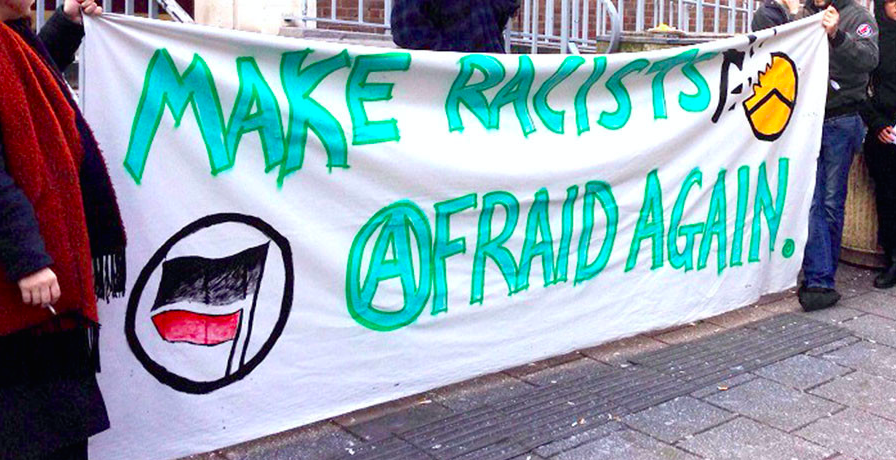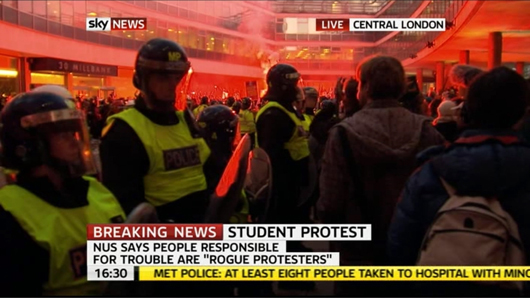Fascism and the far right can come in various guises at universities. Rather than, for example leading demos where they attempt to present themselves as “ubermensch” as part of a “march and grow tactic”, or stirring up race hatred on estates, the far right at British universities usually attempts to proliferate their ideas through being provocateurs. This can be by inviting speakers who specialise in offending (Katie Hopkins, Milo Yiannopoulos) to give talks on campus. It can also be by putting up racist stickers or doing banner drops (National Action, Generation Identity). Here, we will attempt to dissect the various forms that far right activism can take on campuses, and the best ways to combat and defeat it.
Generation Identity and National Action
Before National Action’s proscription by the state in 2016, the group engaged in stunts like putting bananas on a Nelson Mandela statue in London and turning up at various unsuspecting towns unannounced to preach national socialism at bemused shoppers. One of their low level actions was to sticker various universities around the country, the most infamous being Aston, where they also performed nazi salutes. The University of Leeds was also targeted. Due to their proscription, you are unlikely to see National Action stickers around on campuses, although it is useful to be aware that some of its somehow even more assiduous offshoots, like NS131 (National Socialist Anti-Capitalist Action) and Sonnenkrieg Division, have been active in the last few months. The former is known to produce stickers.
National Action’s mantel of provocative acts against “cultural Marxists” in universities was taken up, arguably much more successfully, by Generation Identity (GI). GI attempted to provoke outrage from students at SOAS by stickering the campus with their “Defend Europe” stickers and doing a banner drop outside of Birkbeck facing SOAS. Chased off by students, the group played the free speech victim card after being told they weren’t welcome. Plan C responded with a banner drop of their own and GI retreated from their provocations fairly quietly (apart from some low-profile stickering recently), though it should not be understated how much of a threat this group could pose if they are able to gain a foothold on the British far right. GI have been unable to build the traction their European counterparts have enjoyed, and have been conspicuously quiet (except for a very recent banner drop at Loch Ness in Scotland) over the past few months after a leadership crisis and pressure from anti-fascists. GI are a particularly insidious group, however, and it remains to be seen whether they will put their heads above the parapet any time soon.
Whilst both these groups have been silent recently, their presence in or around universities should be treated extremely seriously. If stickers appear on your campus (or in your town) organise groups to go around ripping off stickers (with keys – nazis have been known to leave razor blades under stickers). If they continue to be a problem, come up with a strategy to beat them off (lobby your union, hold a demo, print leaflets spreading awareness, etc.) Contacting your local anti-fascist group should also be done if you see stickers or any other activity from either of these groups.
Alt Right Speakers (To Berkeley or not to Berkeley)
This facet of far right organising/movement building on university campuses has some overlap with “libertarian” societies at universities in that it is often them that invite alt right/far right speakers to spread their bile on campus. An example of this occurred at the University of Reading in 2017, when the “Free Thought Society” (the President of which was a Conservative who enjoyed antagonising Labour at the Freshers’ Fair for supporting “Socialist Venezuela”) invited Katie Hopkins to speak. In this case, the society involved was not explicitly far right, although the “Free Thought Society”, abiding by the far right’s ahistorical insistence on monopolising free speech, was, consciously or not, attempting to antagonise left wing and especially Muslim students by inviting a virulent islamophobe who aligned herself with Generation Identity and called for a “final solution” to the refugee crisis. In the end, Hopkins cancelled the talk, citing “security concerns” and went on to a give talk in Lewes which was memorable only for the opposition to it and was itself cancelled after being blockaded by anti-fascists.
The “security concerns” cited here perhaps allude to the infamous aborted speech of alt right personality Milo Yiannopolous at Berkeley, California in 2017. Students attempted to get the speech stopped by all legitimate channels, exhausting them all. A demonstration was called outside the Students’ Union, but the talk itself had to be abandoned after a group of Black Bloc protestors attacked the Students’ Union where the talk was being held with rocks and Molotov cocktails. This event has caused alt right provocateurs on both sides of the channel to think twice about talks on campuses, even in places as unlikely as Reading.
Other examples of right wing/alt right demagogues giving talks in the UK in recent times have been Sargon of Akkad at King’s and Jacob Rees-Mogg at UWE. Sargon, an alt right speaker, was invited, as at Reading, by a “libertarian society” who bemoaned the infringement of free speech that supposedly occurred when the talk was disrupted and subsequently cancelled. Some skirmishes did occur during the disruption, the focus being on these rather than the bigotry present in Sargon’s rhetoric. The fact that “free speech” and “libertarian” societies are so obsessed with inviting alt right speakers onto campuses tells us a lot about where their political allegiances really lie – not with some nebulous notion of freedom of speech, a traditionally left wing issue (at Berkeley, not so coincidentally) but with the far right speakers they invite to ferment the culture war the alt right loves to talk about so much (“libertarian” societies will be discussed in more detail below). Sargon subsequently got the train back to Swindon and has since entertained himself with a laughably disastrous European election campaign in the South West that was mired by multiple milk shakings. King’s, unsurprisingly for an institution that would around a year later ban students from their own university for supporting Palestinian self-determination, produced a statement decrying “violent” protest – no word was spoken by King’s management about why they invited someone that thinks rape threats (directed against Labour MP, Jess Philips) or is a horrendous islamophobe onto their campus, or how they totally failed in providing duty of care to their more marginalised students.
Disruptions can be incredibly successful at shutting down fascists and far right speakers on university campuses, but they can sometimes over-step the mark. This can only push the left into a position of having to fend off attacks about “snowflake” students from the right wing press and Conservative politicians. One such example is the disruption of Rees-Mogg’s talk at UWE. Rees-Mogg, admittedly, is on the right of the Tory Party, and has spoken and attended events by the far right Traditional Britain Group (TBG). However, optics must be considered when attempting to combat the far right at universities. Rees-Mogg is a legitimate politician, an MP, part of the ruling party and he was invited to talk by the Political and International Relations Society. All of these factors mean a more cautious strategy should be taken. The action itself did not result in the talk being cancelled. Mogg, although his positions are horrendous, is not a fascist, and to enact tactics to deal with him that would usually be reserved for fascists/the alt right is an own goal, one that the right capitalised on, and will capitalise on again if we continue to make the same mistakes.
If a far right speaker is invited to your campus, disruption, protest and raising awareness are viable, if not necessary tactics. No platforming fascists is justified every time, but Conservatives should be treated differently – protests and leafleting are viable in this scenario, but to steam into a Conservative’s talk is to give the right wing press a field day about students being anti-free speech and the Tories ammunition to further turn our universities into draconian neoliberal hellscapes.
The “Libertarians”
Right-wing societies will often present as “libertarian” (a particularly putrid example of this is the Mises Society at Royal Holloway), which gives them the opportunity to organise in peace, despite their members often being open fascists. “Libertarian” societies are also in existence at Kent and Cambridge, for example, and one society at Reading centred around “free thought” (hence its name, the “Free Thought Society”) was active for a year and invited Katie Hopkins to speak (see above). The societies at Kent and Cambridge have been able to position themselves as some of, if not the most active, political societies on campus because of their ability to invite controversial right wing speakers consistently. Despite the “Libertarian” Society at Kent being infiltrated by left wing activists and its chats, containing overt racism and other bigotry, being leaked, the Students’ Union is allowing it to reform as a society in the coming academic year. At Royal Holloway, the Mises Society (named after a free market advocate that declared his support for Mussolini’s Fascist Italy) is well known for its far right antics. These include posing in front of the historic Founders building with Trump flags, shouting “Oh Tommy, Tommy” boozily on campus late at night and openly admitting to being alt right.
These groups are the most insidious of all, and some, like those at Kent and Royal Holloway, are overtly fascist, barely even bothering to hide behind the guise of “libertarianism”. The fact of the matter is that these groups are dangerous – fascists will try and suppress left wing organising through any means they see fit. Students’ unions are unlikely to act unless their guidelines are broken explicitly, and even then they will often just allow these societies free rein to organise again at a later date with a mere name change. The student and indeed the wider left has to do something. Discussions urgently need to be had to find ways to disrupt these groups spreading their bile and harming other, more vulnerable students.
The best advice we can give here is infiltration, or finding where these societies meet and occupying space until they feel uncomfortable and leave. Additionally, finding explicitly fascist rhetoric coming from the organisations these societies are affiliated to is also advisable. However, safety is paramount here; these groups can and will threaten other students. If it is safer to stay under the radar until you can come up with a plan we would encourage you to do so.
Written by a Plan C member.



